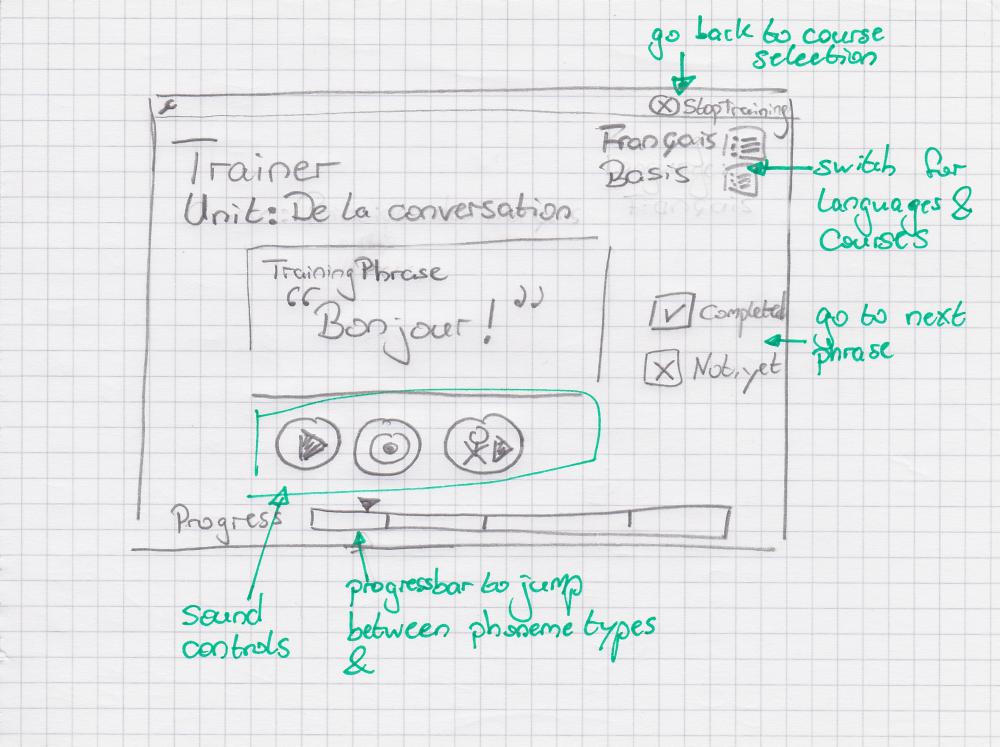KDEEdu/Artikulate/Todo: Difference between revisions
< KDEEdu | Artikulate
| Line 68: | Line 68: | ||
4. PROCEEDING WITH THE TRAINING | 4. PROCEEDING WITH THE TRAINING | ||
* 4.1. Playing the recording provided. | * 4.1. Playing the recording provided. | ||
* 4.2. Recording | * 4.2. Recording one's own voice. | ||
* 4.3. Evaluating | * 4.3. Evaluating oneself for every phrase. | ||
* 4.4. Cumulative Evaluation. | * 4.4. Cumulative Evaluation. | ||
Revision as of 10:18, 29 July 2013
Release 0.2
Blockers
- broken Trainer mode: for now replace it with information that no Trainer mode is included
Release Goals
- provide GHNS interface
- provide training interface
- on demand parsing of courses
- provide at least one language course
- review basic course skeleton phrases
Release 0.3
Release Goals
- port sound recording to Simon
- port XML parsing to Xmlstream
- provide at least two language courses
- complete user documentation
Release Steps
- write release notes
- create tarballs and upload them
- notify sysadmins
- add links to community wiki page
- write notification mail
Documentation
Proposal for Contributor Documentation
1. STARTING WITH ARTIKULATE
- 1.1. General Intro: describing what a contributor can do...
- 1.2. Downloading the source files.
- 1.3. Compiling and installing Artikulate.
- 1.4. Getting data files (artikulate-data repository).
2. EDITING COURSE SKELETONS
- 2.1. Adding new course skeletons to Artikulate.
- 2.2. Adding units to a course skeleton.
- 2.3 . Adding phrases to units.
3. EDITING LANGUAGE COURSES
- 3.1. Creating a new language course from a course skeleton.
- 3.2. Translating phrases to a language.
- 3.3. Adding recordings for phrases.
- 3.4. Tagging phonemes for phrases.
- 3.5. Adding new languages to Artikulate/ Creating new phonology.
Proposal for User Documentation
1. INTRODUCTION
- 1.1. What is Artikulate.
- 1.2. How Artikulate aims to help the user.
2. BEGINNING WITH ARTIKULATE
- 2.1. Choosing a Language.
- 2.2. Choosing a Course.
- 2.3. Choosing a training unit.
2. SCENARIO TRAINING UNITS
- 2.1. What is a Scenario Training Unit.
- 2.2. Contents of a Scenario Unit.
- 2.3. What it aims at.
3. PHONEME TRAINING UNITS
- 3.1. What is Phoneme Training Units.
- 3.2. What it aims at.
4. PROCEEDING WITH THE TRAINING
- 4.1. Playing the recording provided.
- 4.2. Recording one's own voice.
- 4.3. Evaluating oneself for every phrase.
- 4.4. Cumulative Evaluation.
Coding
General User Interface
Course Editor
- broken layout for phrases with several text lines
- when scrolled down, cannot open phrase for edit
- enable the user to add new course skeletons
Trainer
- create concept for trainer UI (when training a unit)
- missing scrollbars for language list
- missing scrollbars for course list
- missing scrollbars for unit list
Core
- set input volume (change at config dialog has no effect currently)

